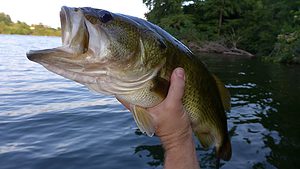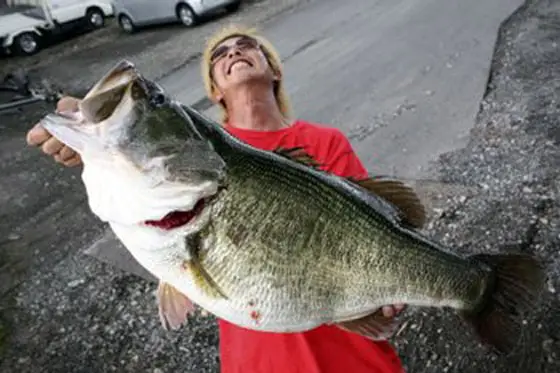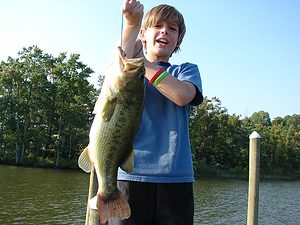Disclosure: Some posts contain affiliate links, which earn us a commission if you make a purchase through them. Positive Fishing © participates in various affiliate networks including the Amazon Services LLC Associates Program.
A good size largemouth bass varies from state to state. Generally, any bass that is larger than the legal keeping limit of the state you are fishing in would be considered a bass of reasonable size.
Legal limits for keeping fish, are not, however, determined by weight! Each state sets a length limit, the length of the fish varies from state to state, but typically most states have a length of 14” as the legal size limit.
For most of the United States, most anglers would consider catching a largemouth bass of 3 pounds or more to be a good size.
In this article, I will cover the following:
- What is Considered a good weight For A Largemouth Bass?
- What Is Considered A Good Length Bass?
- How Big is a Trophy Bass?
- What is the Biggest Bass Ever Caught?
- Where To Catch Big Bass?
- Resident Bass vs. Roamer Bass Comparison
- Largest Bass Caught by State
- Bass Weight vs. Length Chart
- Final Thoughts
What Is Considered A Good Weight For A Largemouth Bass?

Any fish above 5 pounds is a big bass. This would be considered a huge bass in certain states, such as Minnesota or North Dakota (where the largest bass ever caught is below 9 pounds).
Any angler catching a bass of this size would be happy, as this considerably exceeds the average bass size.
What Is Considered A Good Length Bass?
Bass weight vs. bass length is somewhat difficult to get accurate. Typically, an 18” bass would weigh between 3 pounds to 5 pounds.
The wide range is due to fishery biologists calculating the 75th percentile so that the standard weight at a given length was an above-average or “ideal” target. A plump and healthy bass will be in the mid-range of the table. A slender bass will weigh less, and if the bass has a large girth, it will weigh more.
A young largemouth bass gains length fast and can be as large as 4 to 5 inches (around half a pound) by the end of its first summer. Some Largemouth bass of 20 inches have been known to exceed 7 pounds in some states where the water is colder.
You can check out the table for the bass weight vs. length chart at the end of this article. To measure the length of a bass, a bass ruler can be a useful tool to keep in your tackle box.
How Big Is A Trophy Bass?
What is considered a trophy bass will depend on your fishing state. Most anglers consider 10 pounds the benchmark for trophy bass.
However, states such as Montana, North Dakota, Hawaii, and Minnesota have a current record below 10 pounds. For these states, a trophy bass is around 7 pounds.
Likewise, a trophy bass size caught in California, Texas, Florida, and Georgia would be around 12 pounds.
The best way of determining a trophy-size bass is to use 75% of the state record as a general rule of thumb.
The states of Texas and Florida are the best states for catching trophy largemouth bass in the United States!
What Is The Biggest Bass Ever Caught?


The world record bass is held jointly by a specimen bass of 22 pounds 5 ounces caught at Lake Biwa, Japan, and George Perry’s 22 pounds 4 ounces huge bass that was caught at Lake Montgomery, Georgia, in 1932.
Although the Japanese bass is larger in weight than the US state record, the International Game Fish Association (IGFA) requires a new record to outweigh the current record holder by at least 2 ounces to be included.
Where To Catch Big Bass?
California, Texas, Florida, and Georgia are the four states with the largest bass records. Bass tend to grow larger in warmer and clearer water that is around 70-85 degrees Fahrenheit. In the winter, they prefer to move closer to the lake bottom but are still quite active.
Big bass is more likely to be caught in waters around 8 feet to 15 feet. Typically, the largemouth bass is rarely found in water that is deeper than 20 feet.
Resident Bass vs. Roamer Bass Comparison
Resident bass tends to be lazy and stay in the same locations as docks and laydowns. Most anglers will come to the same spots, and because food is plentiful in these areas, the resident bass doesn’t have to go far from its comfort zone.
In these locations, they will also spawn nearby. Bigger predators are typically not in these habitats, and they tend to school together. In reality, this is their “home,” and the habitat suits them.
Roamer bass are fish that live to eat and move around continuously without any fixed location in a lake.
RoamIng bass are better fighters and are generally larger than resident bass. Whilst constantly moving on the hunt for food in the water gives them more exercise and means they tend to grow larger and weigh more.
All bass love to eat minnows and other small fish, but they also prey on crayfish, frogs, and terrestrial and aquatic insects.
Largest Bass Caught by State
| State | Weight | Location | Angler | Year Caught |
|---|---|---|---|---|
| Alabama | 16 lbs, 8 oz | Mountain View Lake | Thomas Burgin | 1987 |
| Alaska | N/A | N/A | N/A | N/A |
| Arizona | 16 lbs, 7 oz | Canyon Lake | Randall White | 1997 |
| Arkansas | 16 lbs, 8 oz | Mallard Lake | Ann Mardis | 1976 |
| California | 21 lbs, 12 oz | Lake Castaic | Micheal Arujo | 1991 |
| Connecticut | 12 lbs, 14 oz | Mashapaug Pond | Frank Domurat | 1961 |
| Delaware | 11 lbs, 10 oz | Wagamons Pond | AJ Klein | 2016 |
| Florida | 17 lbs, 27 oz | Unnamed Lake | Billy O'Berry | 1986 |
| Georgia | 22 lbs, 4 oz | Montgomery Lake | George Perry | 1932 |
| Hawaii | 9 lbs, 9.4 oz | Waita Reservoir | Dickie Broyles | 1992 |
| Idaho | 10 lbs, 15 oz | Anderson Lake | Mrs. M.W. Taylor | N/A |
| Illinois | 13 lbs, 1 oz | Stone Quarry Lake | Edward Walbel | 1976 |
| Indiana | 14 lbs, 12 oz | Unnamed Lake | Jenifer Schultz | 1991 |
| Iowa | 10 lbs, 14 oz | Lake Fisher | Patricia Zaerr | 1984 |
| Kansas | 11 lbs, 12.8 oz | Private Pit Lake | Tyson Hallam | 2008 |
| Kentucky | 14 lbs, 9.5 oz | Highsplint Lake | Mark Ward | 2019 |
| Louisiana | 15.97 lbs | Caney Lake | Greg Wiggins | 1994 |
| Maine | 11 lbs, 10 oz | Moose Pond | Rodney Cockrell | 1968 |
| Maryland | 11 lbs, 6 oz | Huntington Farm Pond | Colton Lambert | 2013 |
| Massachusetts | 15 lbs, 8 oz | Sampson Pond | Walter Bolonis | 1975 |
| Michigan | 11 lbs, 15.04 oz | Big Pine Island Lake | William Maloney | 1934 |
| Minnesota | 8 lbs, 15 oz | Auburn Lake | N/A | 2005 |
| Mississippi | 18 lbs, 2.4 oz | Natchez State Park Lake | Anthony Denny | 1992 |
| Missouri | 13 lbs, 14 oz | Bull Shoals Lake | Marvin Bushong | 1961 |
| Montana | 8 lbs, 12.8 oz | Noxon Rapids Reservoir | Darin Williams | 2009 |
| Nebraska | 10 lbs, 11 oz | Sandpit Near Columbus | Paul Abegglen Sr. | 1965 |
| Nevada | 12 lbs 0 oz | Lake Mead | Micheal R. Geary | 1999 |
| New Hampshire | 10 lbs, 8 oz | Lake Potanipo | G. Bullpit | 1967 |
| New Jersey | 10 lbs, 14 oz | Menantico Sand Wash Pond | Robert Eisele | 1980 |
| New Mexico | 15 lbs, 13 oz | Bill Evans Lake | Steve Estrada | 1995 |
| New York | 11 lbs, 4 oz | Buckhorn Lake | John L. Higbie | 1987 |
| North Carolina | 15 lbs, 14 oz | Private Pond | William H. Wofford | 1991 |
| North Dakota | 8 lbs, 7.5 oz | Nelson Lake | Leon Rixen | 1983 |
| Ohio | 13 lbs, 2 oz | Private Pond | Roy Landsberger | 1976 |
| Oklahoma | 14 lbs, 13.7 oz | Cedar Lake | Dale Miller | 2013 |
| Oregon | 11 lbs, 1.6 oz | Ballenger Pond | B. Adam Hastings | 2002 |
| Pennsylvania | 11 lbs, 3 oz | Birch Run Reservoir | Donald Shade | 1983 |
| Rhode Island | 11 lbs, 3.2 oz | Johnson's Pond | Brandon Migliore | 2016 |
| South Carolina | 16 lbs, 2 oz | Lake Marion | P.H. Flanagan | 1949 |
| South Dakota | 9 lbs, 3 oz | Hudson Gravel Pit | Richard Vierick | 1999 |
| Tennessee | 15 lbs, 3 oz | Chickamauga Lake | Gabe Keen | 2015 |
| Texas | 18 lbs, 2.8 oz | Lake Fork | Barry St.Clair | 1992 |
| Utah | 10 lbs, 2 oz | Powell Lake | Sam Lamanna | 1974 |
| Vermont | 10 lbs, 4 oz | Lake Dunmore | Tony Gale | 1988 |
| Virginia | 16 lbs, 4 oz | Connor Lake | Richard Tate | 1985 |
| Washington | 12 lbs, 9 oz | Lake Bosworth | Bill Evans | 2016 |
| West Virginia | 9 lbs, 9.9 oz | Dog Run Lake | Eli Gain | 2001 |
| Wisconsin | 11 lbs, 3 oz | Ripley Lake | N/A | 1940 |
| Wyoming | 11 lbs, 9 oz | Kleenburn Ponds | Caleb Salzman | 2018 |
Bass Weight vs. Length Chart
| Bass Length | Bass Weight In lbs |
|---|---|
| 12" | 0.9 |
| 13" | 1.16 |
| 14" | 1.47 |
| 15" | 1.83 |
| 16" | 2.25 |
| 17" | 2.73 |
| 18" | 3.28 |
| 19" | 3.89 |
| 20" | 4.59 |
| 21" | 5.36 |
| 22" | 6.22 |
| 23" | 7.17 |
| 24" | 8.22 |
| 25" | 9.35 |
| 26" | 10.6 |
| 27" | 11.95 |
| 28" | 13.42 |
| 29" | 15.01 |
| 30" | 16.73 |
| 31" | 18.58 |
| 32" | 20.56 |

Final Thoughts
All anglers love to catch big fish, especially bass! Some states have the advantage of larger than average bass sizes, but every state has its fair share of good size bass.
Whether you get a trophy bass or not, always go fishing to enjoy yourself; that expectation of getting the bass of a lifetime fuels us anglers with excitement every time we take our rods out.
I hope that this was an informative article and an enjoyable read. You can read more on the best bass fishing lures and all the different bass types in North America that you can catch and how and where to fish for them.
- 5 Best Fishing Bags For Getting Your Gear Organized - January 13, 2025
- 4 Essential Surf Fishing Rigs - January 11, 2025
- How To Know The Sex Of A Fish You Have Caught? - December 9, 2024

